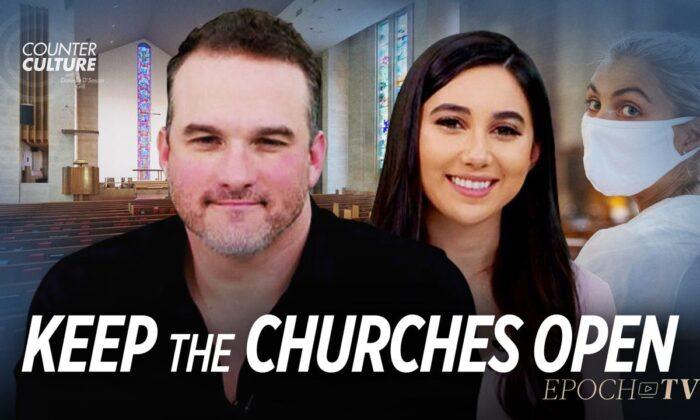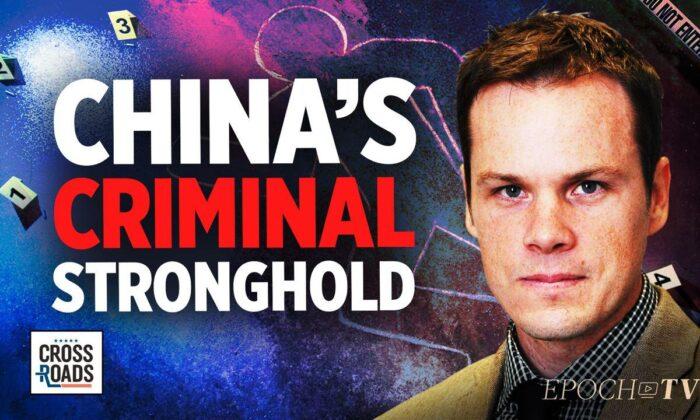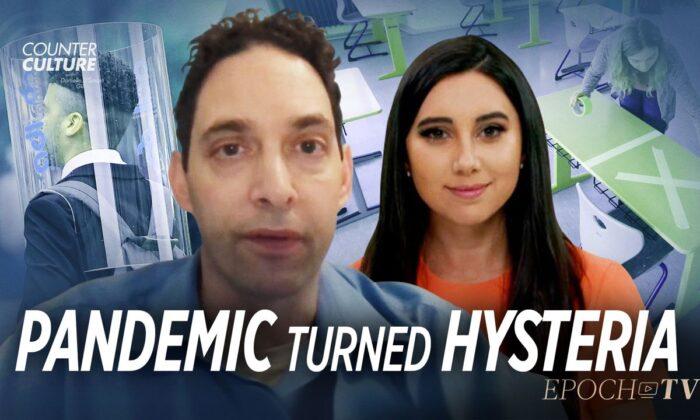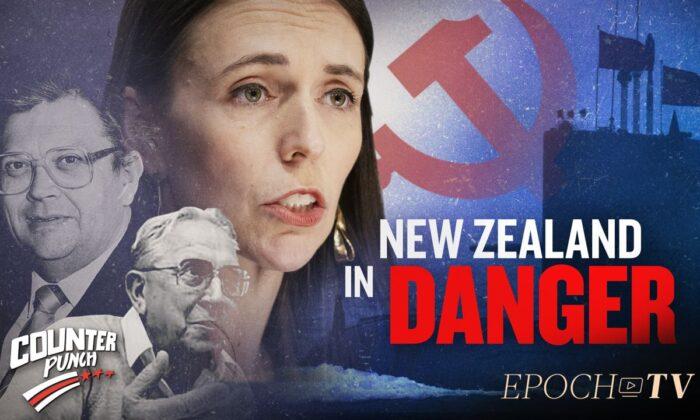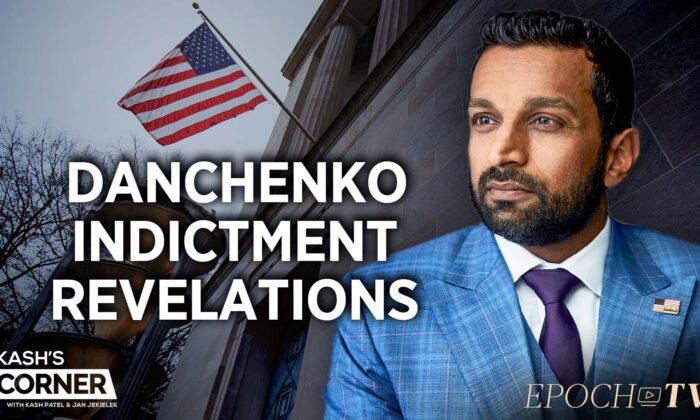One of the places that overreach has been particularly egregious is interfering with the relationship between people of faith and their church communities, going so far as to ban worship services while allowing strip clubs to remain open in some areas of the country (the left is still furious about losing that Supreme Court case). Many churches caved to the state in the name of safety, but many more stood their ground to defend the importance of coming together as a group to worship when the government was trying its best to separate and isolate its citizens.
This is largely the subject of “Keep the Churches Open,” as the name suggests, and while it’s an episode that deals exclusively with the Christian faith, going so far as to feature an interview with D’Souza Gill’s own pastor, it is neither preachy nor inaccessible to anyone of other faiths.
While guest David Engelhardt makes frequent reference to scripture throughout the roughly half-hour running time, it never comes across as proselytizing or threats of eternal damnation for non-believers. Rather, these references show the ways in which his life and his belief are deeply grounded in an established moral framework, something that is desperately needed as the political left seeks to rebuild American values based on a moral code that is no more stable than shifting sand.
D’Souza Gill opens the episode by reminding the audience just how quickly the government came after churches once the Wuhan coronavirus hit America’s shores, deeming the services they provide “non-essential,” in a move that shocked people of faith. It probably shouldn’t have, given how long the government has been fighting to demonize religion as a great evil holding the nation back from true enlightenment and progress. The reality, of course, is that the government needs to undermine the belief in a higher power, as one cannot worship both God and the state (or Big Tech or Hollywood entertainers) at the same time. This is the ultimate goal of the cultural Marxists running our most powerful institutions, and they clearly seized on the chaos of the pandemic to try to deal a death blow to religion once and for all.
Unfortunately for them, there are pundits like D’Souza Gill, who gives an impassioned defense of the importance of religion in an increasingly secular world. She argues from a position of her own personal and clearly deeply-held faith for why maintaining a connection to God and the church matters and why people of faith need to stand up for the right to attend in-person services.
She highlights two separate pastors, one in the United States and one in Canada, who stared down police that came to shut down their services. The idea of police showing up at places of worship should send a chill down the spine of anyone screaming about the rise of fascism in the West, but unfortunately the people who need to see these examples the most aren’t likely to get past the fact that the police were accosting Christians, which to them will automatically mean the police were in the right.
These “compassionate” members of the left would do well to remember that churches provide more than just worship services to the public. D’Souza Gill touches on the increased rates of depression, anxiety, and suicidal thoughts throughout the course of the past two years among an increasingly isolated population to highlight just how crucial it is for people to have a place like church to come together for human interaction and support. She could easily have added other services churches provide, like hot meals, rummage sales, childcare, and spaces for Alcoholics Anonymous or Narcotics Anonymous meetings, as a reminder that churches aren’t just for people of faith. As much as leftists and progressives like to insist that religious conservatives are hateful and bigoted, they’re the ones who demanded the closure of the institutions that exist by their very nature to welcome and care for the poor, needy, and downtrodden.
D’Souza Gill’s guest is among the pastors who chose to keep their churches open during the pandemic, albeit after initially closing down. This is an impressive feat, considering Pastor David Engelhardt preaches at Kings’ Church in New York City, a city in direct competition with California for the title of most draconian COVID-19 restrictions in the United States. Engelhardt is clearly the kind of pastor D’Souza Gill calls for in her monologue; one that remembers he’s supposed to be the shepherd leading his flock, rather than merely another sheep cowering in the face of uncertainty.
From the onset it’s apparent that despite his age (he’s younger than you might expect), his response to the upheaval of 2020 and 2021 came from a truly faith-based perspective once he’d gotten outside of New York City, where everyone he knew was shutting down their churches, to connect with people like Pastor Rob McCoy and other members of Calvary Chapel and Charlie Kirk, the founder of Turning Point USA.
His eyes having been opened by those who weren’t folding to government edicts like lawn chairs, Engelhardt began to really think about the relationship between church and state from a Biblical perspective. Eventually he came to the conclusion that while there are certain arenas where the state does hold sway over the church, like preventing the murder of congregants who refuse to tithe, when it comes to things like staying open, the state has no legitimate say in what the church does.
This is exactly the sort of separation of church and state the left demands in any other facet of life, but when it comes to COVID-19 they suddenly forget this clear delineation is something they’ve wanted for decades, even though no one at Kings’ Church died or became seriously ill.
Engelhardt even points to the kind of scripture that underpinned his decision to reopen the church while encouraging churchgoers to stay home if they didn’t feel well or if they simply weren’t comfortable coming to church amid a pandemic. He didn’t force anyone to come, he simply kept his doors open and gave them the choice. He also explains that since his congregation is largely in their 20s and 30s, they were at very low risk to begin with.
New York—both the city and the state—are again panicking again because of Omicron, but Engelhardt doesn’t foresee either trying to shut his church down again thanks to last year’s ruling from the Supreme Court. He and D’Souza Gill discuss the nature of the church in providing a place for people to go when they need guidance or are feeling disconnected or depressed and how important that is given everything that’s happened in the last two years.
Engelhardt takes the time to state the obvious: that life is inherently risky, and in a place like NYC you’re taking a risk just by crossing the street. To try to pretend the risk of COVID-19 can somehow be erased is simply unrealistic.
D’Souza Gill shifts gears to the other major event of the summer of 2020 that impacted major cities and churches nationwide: the Black Lives Matter protests. Engelhardt again takes a very thoughtful, scripture-based approach to the discussion, though he also explains that he was a lawyer before becoming a pastor and therefore has even more levels of analysis to bring to the table.
His breakdown of the George Floyd incident will very likely anger Christians who have bought into the meme that Jesus was a socialist and thus embraced the idea that the church should be used for social justice, but his rationale is hard to argue against for anyone willing to look at the incident from a Biblical perspective, rather than relying on raw emotion.
He further talks about language and the way words are used to mean things beyond the strict dictionary definition, with D’Souza Gill chiming in to flesh out what should be obvious but somehow still needs to be explained. Black Lives Matter as an organization does not mean that black lives matter, something to which everyone readily agrees. Black Lives Matter means that police are evil, every white person is racist, and black citizens in this country are being actively hunted by law enforcement, none of which are true. This brings Englehardt back to scripture and the concept of how necessary it is for morality to be based on truth, as morality based on lies is inherently flawed and will eventually crumble, or in the case of current woke ideology turn into a circular firing squad where no one can ever be good enough.
D’Souza Gill and Engelhardt dig deeper into the idea of truth versus lies when it comes to the media and how media narratives have infected even the church. Many churches felt compelled to speak out during the BLM riots and have continued to champion the cause of social justice simply because they don’t yet realize they’ve been lied to.
Engelhardt again discusses Biblical teachings and what Christianity has to say about knowing what is true, and by this point it’s not hard to understand why his congregants show up every Sunday. He expresses a real understanding of the teachings of the Bible that has been lost as many churches embrace aspects of progressivism that simply aren’t grounded in reality, or Christianity for that matter.
In an effort to temper the emotional response to situations like those involving Floyd, Engelhardt essentially returns to the idea of the separation of church and state, this time reminding the church of this premise rather than the other way around. While the state has been all too happy to wade into matters that should be left to the faithful to decide, the church has also begun to preach on topics that would be better left to the courts to arbitrate. That’s not to say the church can’t or shouldn’t weigh in on current events, just that the church should address sensitive topics from a position of truth, not fear or emotion.
This response led Engelhardt to lose much of his congregation in 2020, but he’s gained much of it back from people searching for truth and not just to be told whatever will make them feel good in the short term. D’Souza Gill has experienced this personally, relaying a story about the pastor at her previous church who told the entire congregation he’d been let go for speeding with only a warning purely because he was white. Engelhardt explains this is something called ethnic gnosticism, where depending on a person’s ethnicity, anyone of another ethnicity can simply “know” what’s in their heart based on their skin color. This runs directly counter to Christianity, which states that only God can know a person’s heart, and Engelhardt has no problem standing firm and telling anyone who disagrees with this fundamental tenet that there are thousands of other churches in New York that they can attend.
They end the interview with a lovely discussion of Christmas and the meaning behind it, then a question on how to discuss one’s faith with friends or colleagues who are not particularly religious. Engelhardt and D’Souza Gill provide two very different answers, both of which are worth pondering for anyone who wishes to talk more openly about being a Christian in a country that seems to be discouraging this kind of discussion to an increasing degree. It’s an excellent cap to a perfectly timed episode that you shouldn’t hesitate to watch, like, and share.
